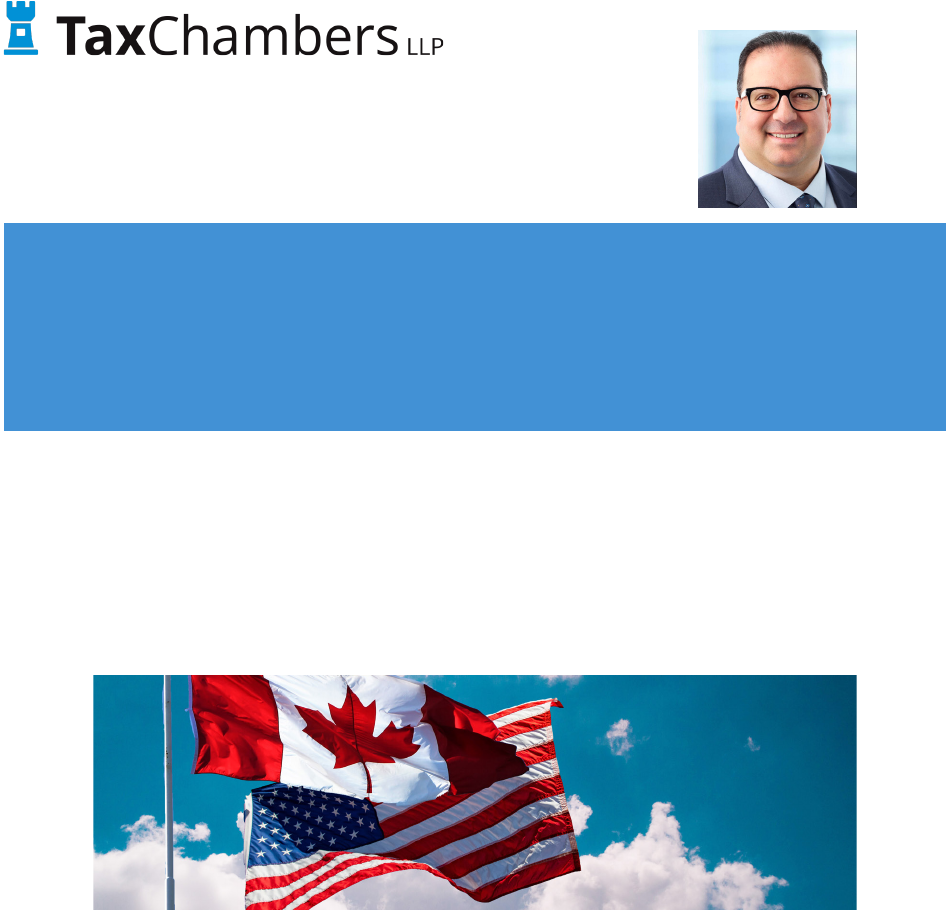
As Canadian housing prices continue to set new records, more homeowners are selling
their principal residence at huge gains from the original purchase price. That’s ne for
Canadian tax residents, as the gains will likely be tax-free under the Canadian principal
residence exemption. For U.S. citizens living in Canada, to sell a principal residence and
avoid U.S. capital gains tax, or signicantly reduce it, requires proper cross-border tax
planning. There may be a solution to this problem if you are lucky enough to have a
Canadian-only spouse to help facilitate a lifetime gifting strategy.
THE ISSUE:
While a Canadian citizen selling their Canadian principal residence is generally not subject to any
income tax on the gain, the same is not true if they are also a U.S. citizen (or a U.S. green card holder).
Such U.S. citizens may be able to exclude up to US$250,000 of the capital gain triggered on the sale of a
qualifying home, but if the gain is signicant, the U.S. tax implications can also be signicant.
When a U.S. citizen living in Canada wishes to sell a principal residence, there are many hidden Canadian
and U.S. tax issues that can exist. For example, the entitlement to the Canadian principal residence
exemption may be at jeopardy if the property has had a change of use (e.g., renting out all or a portion
of the property without making the relevant tax elections or making physical changes to the property
to accommodate a business). Such hidden tax issues can be mitigated or resolved with proper planning
and analysis by a cross-border tax practitioner.
For example, Andrew is a U.S. citizen living in Canada. He is married to Cathy, a Canadian citizen and
resident. In 2000, Andrew and Cathy jointly purchased a home in Toronto for CDN$1M. Today, the current
fair market value of their home is CDN$4M, and they are interested in selling. If the property qualies as
their principal residence, Andrew and Cathy will have no Canadian income tax to pay. However, Andrew,
as a U.S. citizen, would be subject to U.S. capital gains taxes for gains attributed to him that exceed the
U.S. principal residence exclusion of US$250,000. Assuming a 1.25 Canadian/U.S. exchange rate and
that 50% of the gain is attributed to Andrew (more can be attributed to Andrew depending upon the
circumstances), he would be subject to upwards of US$190,000 in U.S. capital gains tax.
Michael Cirone, J.D., LL.M. (U.S. Tax, NYU)
Canada/U.S. Cross-border Tax, Trust and Estate Planning Lawyer
Admitted to Practice: Ontario and New Jersey
Registered with the Law Society of Ontario as a Foreign Legal Consultant (U.S. Law)
May 18, 2022
How U.S. Citizens Living In Canada Can
Sell A Principal Residence And Avoid U.S.
Capital Gains Tax

THE SOLUTION:
Common solutions include renouncing U.S. citizenship or dying as the owner of the Canadian principal
residence. Both solutions serve to eliminate U.S. capital gains tax. However, the former is not a feasible
option for some U.S. citizens due to personal circumstances and/or the U.S. tax cost of renouncing. And
the latter is impracticable for a family who wants to sell during their lifetime.
To sell a principal residence and avoid capital gains tax, it may be benecial for Andrew and Cathy to
structure ownership of the Canadian home in the name of the spouse who is not a U.S. citizen. Ideally,
this structure would be implemented upon purchasing the home. Since Andrew and Cathy already
purchased the property jointly, sole ownership could be transferred to Cathy prior to selling through a
lifetime gifting transaction to eliminate the U.S. capital gains tax that would otherwise be payable by
Andrew to the IRS.
It’s important to note that gifts from U.S. citizen spouses to non-U.S. citizen spouses do not qualify for
the unlimited marital deduction that allows tax-free transfers between spouses. Such gifts to a non-U.S.
citizen spouse do, however, qualify for a limited annual exclusion (US$164,000 for gifts in 2022). Any
gifting beyond that would have to be covered by the U.S. citizen using some of their lifetime U.S. gift
tax exemption, which is the amount that a U.S. citizen can give away during their lifetime (or pass at
death) without incurring U.S. gift tax or U.S. estate tax. The exemption amount is indexed for ination
every year (US$12.06M per individual for 2022). The Biden administration has discussed lowering this
amount to as low as US$3.5M; failing which, the exemption will automatically decrease to an estimated
US$6.2M as of January 1, 2026. Many practitioners advise their clients on the possibility of a “use it or
lose it” scenario with respect to lifetime gifting.
After proper planning and implementation of a lifetime gifting transaction, Cathy could sell her 100%
interest in the house to a third-party purchaser. Since Andrew no longer owns the house at the time of
the sale, there will be no U.S. capital gains tax to pay.
Careful attention must be given to ensure the lifetime gifting strategy is Canadian and U.S. tax
compliant and other potential tax issues are properly addressed. Examples of potential issues and
special considerations include:
• Whether or not the gift is made “incident to divorce” (in which case the gift may be US taxable);
• The quantum of the gift that must be reported to the IRS on a U.S. gift tax return by the donor
spouse, which may require evidence to support the percentage of interest in the property
attributed to the gifting spouse;
• Whether local land transfer tax is payable for the real estate transfer;
• Legal documents required to properly formalize the gift;
• Ensuring that a local real estate lawyer properly registers the transfer; and
• Any relevant family law issues that arise in connection with the lifetime gifting strategy.
The lifetime gifting strategy is a specically crafted, complex solution to limit or eliminate future U.S.
capital gains tax liability regarding the sale of a Canadian principal residence, and it’s fraught with traps
that need to be carefully navigated. Not all solutions are applicable for every individual and unique
circumstance, and other complex considerations may arise.
If you are a U.S. citizen living in Canada wishing to sell a principal residence and avoid
U.S. capital gains tax, contact Michael Cirone to explore all available options. Michael
is a Canada/U.S. cross-border tax, trust and estate planning lawyer at TaxChambers LLP,
a boutique tax law rm in Toronto.
155 University Avenue, Suite 300
Toronto, ON, Canada M5H 3B7
Phone: 647-748-9797
E-mail: michael.cirone@taxchambers.ca
